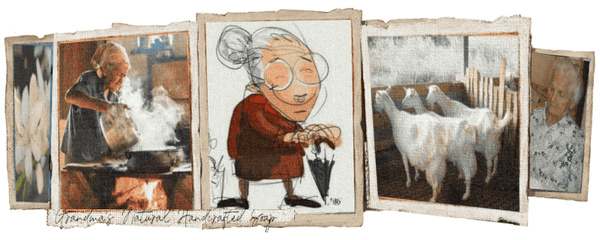Why Handcrafted Soap?
Why All Natural Handcrafted Soap?
Why you may ask, should I buy handmade soap when I can get more soap for less money at the grocery store?
Generally, the commercial soaps carried at most chain stores, etc. are full of chemical additives, additives that not only dry out your skin but can lead to rashes and other irritations. This is not only because of the synthetic additives in the soap but also because most soap companies take the glycerin out of their soap.

Handmade Soap is soap in its true, pure form. It gently cleanses away excess oils and bacteria, but doesn't strip your skin of its natural oils.
IF the commercial soap company does put in some natural ingredients along with its synthetic ones, they do so in such small quantities as for it to be inconspicuous in the soap. Its main purpose is to catch the eye of the consumer and give them the illusion that this soap is more natural. f you read the ingredient labels though, the soap is still primarily made with synthetic ingredients.
Handmade soap is a cleanser made with simple ingredients that are good for your skin. In the handcrafted soap making process, oils and fats are combined with lye to produce soap and glycerin. Some people may question the use of lye in handmade soap. The fact is that all soap is made with lye. What needs to be made clear is that once the process of saponification is complete, the lye and oil molecules have combined and chemically changed into soap and glycerin.

Lye must be used to make the soap, but there should never be any remaining lye in the final bar to hurt the skin. Saponification is the chemical reaction created by combining these oils or fats with lye and water.
Soap is made by adding water, oil and butters together, along with something to form them into soap (an alkali). That ingredient is Sodium Hydroxide which is lye. For liquid soaps, it is Potassium Hydroxide. The chemical reaction is called saponification. The soap maker must calculate the correct amount of lye for the specific oils used in each recipe. If too much lye is used, the bar may be hard and crumbly. If too little, the bar becomes soft and will become rancid faster, due to the natural oils & butters that are used in handmade soap.
Saponification is a chemical reaction that takes place when oil is mixed with an alkali solution, such as sodium hydroxide (lye), water & oils or butters. In other words, the oil and lye combine to make soap. When the proper amounts are used at the proper temperatures, all of the lye and oil are consumed by the reaction and only the soap remains
The resulting reaction creates soap and glycerin. Soap cleanses the skin while glycerin moisturizes it. Many of our handmade soaps also contain butters and other oils to increase the moisturizing effect of the soap and herbs and other natural items for an exfoliate.
Glycerin is naturally produced during the soap making process. In fact, pound for pound, glycerin costs more than soap, which is why most soap companies remove the glycerin from the soap and sell it to manufacturers of lotion. We do not remove the glycerin from our handcrafted soap, so when you purchase soap made by us, it contains all of the naturally occurring glycerin.

Usage and Storage
Since handcrafted soap has no synthetic chemical preservatives but has natural preservatives such as , grape seed oil extract or Vitamin E, your bar of handcrafted soap needs more care and diligence to insure a long life. Handcrafted soap is best stored out of water so that it air dries. Rest your soap on a draining soap dish or stand it on its side, out of the spray range of the shower head. If left in water, handcrafted soap tends to dissolve due to the soap and glycerin molecules that wash clean with water.
Porch.com Article - Advice Soap Making.
